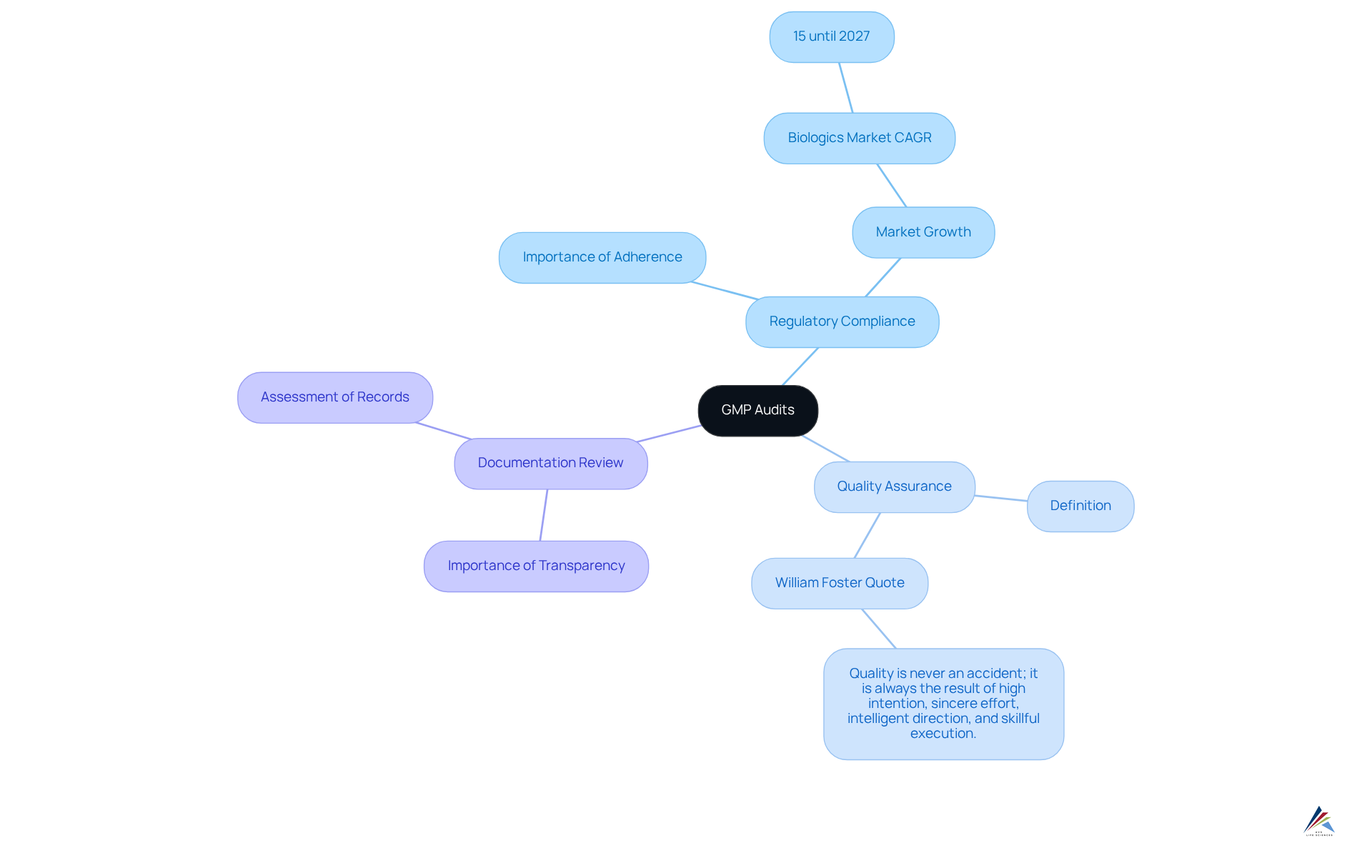GMP Audit: Key Steps to Ensure Successful Preparation

Overview
This article addresses the critical steps necessary for effective preparation for a GMP audit, highlighting the significance of regulatory compliance, quality assurance, and meticulous documentation. It presents essential preparation strategies, including:
- Conducting pre-assessment reviews
- Training staff
- Employing audit management tools
These strategies are vital for cultivating a culture of quality and ensuring strict adherence to regulatory standards. By focusing on these key areas, organizations can navigate the complexities of compliance with confidence and authority.
Introduction
GMP audits are the cornerstone of quality assurance in manufacturing, guaranteeing that products adhere to stringent regulatory standards. As the biologics market experiences rapid growth, the significance of meticulous audit preparation becomes increasingly critical; organizations that excel in this area not only ensure compliance but also improve operational efficiency.
Nevertheless, with various pitfalls present in the preparation stages, how can companies adeptly navigate the complexities of GMP audits to secure successful outcomes?
Understand the Basics of GMP Audits
GMP audits are systematic evaluations of a manufacturing facility's processes, systems, and documentation, crucial for ensuring compliance with regulatory standards. These assessments play a vital role in confirming that products are consistently manufactured and regulated according to established quality standards. Key components of GMP audits include:
- Regulatory Compliance: Adherence to local and international regulations, such as those established by the FDA and EMA, is paramount. With the biologics market expected to , the need for rigorous GMP audit evaluations becomes increasingly essential for companies navigating this growing landscape.
- Quality Assurance: This entails a comprehensive assessment of procedures to guarantee they adhere to established quality standards. As William Foster aptly stated, "Quality is never an accident; it is always the result of high intention, sincere effort, intelligent direction, and skillful execution." Effective quality assurance not only safeguards product integrity but also enhances overall manufacturing quality, which is essential in a competitive market.
- Documentation Review: A meticulous assessment of records is necessary to confirm that all procedures are documented and adhered to correctly. This element is essential for upholding transparency and responsibility, which are crucial for successful evaluations.
AVS Life Sciences, with its vast experience and customized consulting skills, is well-prepared to assist clients during the GMP audit process, ensuring that they meet all required regulatory standards. Comprehending these foundational elements is vital for effective preparation, as they emphasize the crucial areas needing focus and attention during the evaluation process. The significance of GMP audits goes beyond adherence; they are essential for nurturing a culture of quality and ongoing enhancement in pharmaceutical production.

Follow Key Steps for Effective Audit Preparation
To effectively prepare for a [GMP audit](https://avslifesciences.com/industry-news/cders-quality-management-maturity-program), organizations must follow these key steps:
- Conduct a Pre-Assessment Review: Evaluate your current adherence status by examining previous evaluation reports and identifying areas for enhancement. Organizations that regularly assess their compliance posture can significantly reduce the time taken to identify and rectify issues, ultimately saving an average of $4 million in revenue per non-compliance event.
- Create an Inspection Checklist: Develop a thorough checklist that encompasses all essential documentation, procedures, and aspects to be examined during the review. Effective inspection checklists from pharmaceutical firms frequently include particular GMP standards, guaranteeing that all essential areas are addressed. As Paul Koziarz highlights, "Without adherence to regulations, many organizations wouldn’t have security controls in place, and there would be no consistency of standards among the protocols being used."
- Train Your Staff: Ensure that all employees involved in the evaluation process are trained on GMP requirements and understand their roles during the review. Ongoing training on compliance standards is crucial, as it equips staff to meet expectations and improves overall readiness for evaluations.
- Perform Mock Evaluations: Carry out internal reviews to replicate the real evaluation environment, enabling your team to practice and recognize potential issues. This proactive method can result in and improved results, as teams become acquainted with the review procedure.
- Organize Documentation: Collect and arrange all pertinent documents, including SOPs, training records, and batch records, to ensure easy access during the review. Keeping a well-equipped 'war room' with all essential documentation can greatly minimize confusion and enhance the review process.
- Establish a Communication Plan: Appoint a liaison for the auditors and ensure that all personnel understand how to communicate effectively during the evaluation. Clear communication is essential for addressing auditor inquiries promptly and sustaining a professional atmosphere during the examination.
By adopting these measures, organizations can improve their readiness for a GMP audit, ultimately resulting in successful results and adherence to regulatory standards.

Identify and Avoid Common Audit Preparation Mistakes
To enhance your audit preparation, be aware of these common mistakes:
- Inadequate Documentation: Failing to maintain complete and accurate records can lead to significant compliance issues. Statistics indicate that stem from inadequate or inaccurate documentation. Poor documentation practices can result in regulatory penalties, operational disruptions, reputational damage, and legal risks. Ensure all documents are up-to-date and readily available to demonstrate adherence to the gmp audit.
- Insufficient Staff Training: Employees who are not properly trained may face difficulties during the review, resulting in confusion and possible non-compliance. Consistent training sessions are crucial, as organizations that invest in thorough training programs frequently observe enhanced evaluation results and decreased mistakes.
- Disregarding Earlier Review Results: Failing to address issues identified in prior evaluations can lead to recurring findings. Review past reports and implement corrective actions to avoid the pitfalls of non-compliance, which can lead to regulatory penalties and operational disruptions. Additionally, ensure that outdated policies and procedures are updated to align with current regulations.
- Poor Communication: Failing to establish clear communication channels can hinder the evaluation process. Ensure that all team members understand their roles and responsibilities, as effective communication is essential for a seamless evaluation experience. Transparent communication pathways are essential for guaranteeing adherence and enabling a successful review.
- Neglecting Mock Evaluations: Skipping mock evaluations can leave organizations unprepared for the real thing. Consistent practice aids in recognizing weaknesses and fostering confidence, ultimately improving the overall quality of the evaluation process. Organizations that carry out practice evaluations often discover that they can tackle potential issues proactively, resulting in improved compliance outcomes.

Utilize Resources and Tools for Successful Audit Readiness
To enhance your audit preparation, consider leveraging the following resources and tools:
- GMP Audit Checklists: Standardized checklists are essential for ensuring comprehensive coverage of all audit aspects. Customize these checklists to fit your particular procedures and regulatory demands, making sure nothing is missed.
- Audit Management Software: Implementing robust software solutions can significantly streamline the review process. These tools assist in documentation management, monitor review results, and improve communication among teams, resulting in more effective assessments.
- Training Programs: Investing in specialized training initiatives centered on GMP standards and assessment readiness is essential. Such programs improve staff expertise and abilities, guaranteeing your team is well-prepared for the evaluation.
- Consulting Services: Engaging with regulatory specialists or consultants can provide invaluable support. Their throughout the assessment preparation process can help navigate complex regulatory environments effectively. AVS Life Sciences, for instance, has toured more than 75 facilities in 12 countries, showcasing their extensive experience in the field.
- Industry Guidelines: Regularly refer to guidelines from regulatory bodies like the FDA or EMA. Remaining informed about the most recent requirements and best practices in GMP compliance is essential for achieving successful results in a GMP audit. As Peter Drucker noted, "Efficiency is doing things right; effectiveness is doing the right things," emphasizing the importance of thorough preparation.
- Recent Developments: The recent acquisition of ValidPath by AVS Life Sciences enhances their capabilities in quality engineering, further supporting the need for expert consulting services during audits.

Conclusion
GMP audits are critical evaluations that ensure manufacturing facilities comply with regulatory standards and maintain product quality. The preparation process for these audits transcends mere compliance; it fosters a culture of quality and continuous improvement within the organization. By recognizing the importance of GMP audits and implementing effective preparation strategies, companies can navigate the complexities of regulatory compliance with confidence.
This guide highlights several key steps to enhance readiness for GMP audits:
- Conducting pre-assessment reviews
- Creating detailed checklists
- Training staff
- Performing mock evaluations
- Organizing documentation
- Establishing clear communication plans
These are vital components of a successful audit preparation strategy. Furthermore, awareness of common mistakes—such as inadequate documentation and insufficient staff training—can help organizations avoid pitfalls that jeopardize compliance.
Ultimately, the significance of thorough GMP audit preparation cannot be overstated. It is essential for ensuring regulatory adherence, safeguarding product integrity, and enhancing overall operational efficiency. Organizations are encouraged to leverage available resources, such as audit management software and consulting services, to bolster their preparation efforts. By prioritizing these practices, companies can achieve successful audit outcomes and contribute to a stronger commitment to quality in the manufacturing sector.
Frequently Asked Questions
What are GMP audits?
GMP audits are systematic evaluations of a manufacturing facility's processes, systems, and documentation, crucial for ensuring compliance with regulatory standards and confirming that products are consistently manufactured according to established quality standards.
Why are GMP audits important?
GMP audits are important for ensuring regulatory compliance, safeguarding product integrity, enhancing overall manufacturing quality, and nurturing a culture of quality and ongoing improvement in pharmaceutical production.
What key components are involved in GMP audits?
Key components of GMP audits include regulatory compliance, quality assurance, and documentation review.
What is meant by regulatory compliance in GMP audits?
Regulatory compliance refers to adherence to local and international regulations, such as those established by the FDA and EMA, which is essential for companies operating in the biologics market.
How does quality assurance play a role in GMP audits?
Quality assurance involves a comprehensive assessment of procedures to ensure they meet established quality standards, thereby safeguarding product integrity and enhancing manufacturing quality.
Why is documentation review critical in GMP audits?
Documentation review is critical because it involves a meticulous assessment of records to confirm that all procedures are documented and followed correctly, which upholds transparency and accountability.
Who can assist with the GMP audit process?
AVS Life Sciences, with its extensive experience and customized consulting skills, can assist clients during the GMP audit process to ensure they meet all required regulatory standards.
